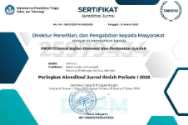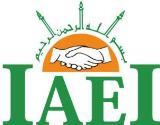JOURNAL
Ajizi, M. N. (2024). Analysis of the Effectiveness of the Green Banking Implementation Model on Financing Distribution in Islamic Banks. 1-128.
Ardhana, R. L., Suhendro, S., & Kuriniati, S. (2024). Analysis of Factors Affecting Financial Performance. Journal of Economic, Business and Accounting (COSTING), 7 (3), 4639-4647. https://doi.org/10.31539/costing.v7i3.9051
Arhinful, R., & Radmehr, M. (2023). The effect of financial leverage on financial performance: evidence from non-financial institutions listed on the Tokyo stock market. Journal of Capital Markets Studies, 7(1), 53-71. https://doi.org/10.1108/JCMS-10-2022-0038
Donath, L., Mircea, G., Neamţu, M., & Sîrghi, N. (2023). A mathematical approach to network contagion regarding greening banks' policies. Economic Research Ekonomska Istrazivanja, 36(1). https://doi.org/10.1080/1331677X.2023.2180057
Ge'e, F., Waruwu, K., Damanik, H., & Sitompul, J. (2023). The Effect of Operating Costs on Net Income at National Private Banks Listed on the Indonesia Stock Exchange. Jurnal Neraca Agung, 13(1), 68. https://doi.org/10.46930/neraca.v13i1.2867
Goh, T. S. (2024). The Effect of CSR, Managerial Ownership, Green Banking, and Financial Ratios on Performance in the Banking Sector. Owner: Accounting Research and Journal, 8, 4745-4756.
Hanif, Wahyu Ningsih, N., & Iqbal, F. (2020). Green Banking on the Profitability of Islamic Commercial Banks in Indonesia. Scientific Journal of Finance and Banking, 3(2), 86-99.
Hasibuan, E., Theresya, H., Gaol, L. F. L., & Sitepu, W. R. B. (2021). The Effect of Third Party Funds, Operating Expenses on Operating Income, and Loan to Deposit Ratio on Profitability in Banking Companies Listed on the Indonesia Stock Exchange for the 2016-2018 Period. Economics, Finance, Investment and Sharia (EKUITAS), 2(2), 194-199. https://doi.org/10.47065/ekuitas.v2i2.671
Hastuti, T., & Kusumadewi, R. K. A. (2023). The Effect of Green Banking on Firm Value: The Mediating Role of Bank Efficiency. Indonesian Accounting and Business Review, 7(2), 380-393. https://doi.org/10.18196/rabin.v7i2.18312
Hayati, N., & Yulianto, E. S. (2020). The Role of Sustainable Finance in the Banking Industry in Supporting Sustainable Development Goals. Journal of Business and Economic Accounting, 6(1), 1633-1652. https://doi.org/10.33197/jabe.vol6.iss1.2020.473
Hutagalung, I. P., & Darnius, O. (2022). Panel Data Regression Analysis with Common Effect Model (CEM), Fixed Effect Model (FEM) and Random Effect Model (REM) Approaches (Case Study: HDI North Sumatra Period 2014 - 2020). FARABI: Journal of Mathematics and Mathematics Education, 5(2), 217-226. https://doi.org/10.47662/farabi.v5i2.422
Juwita, C. P., & Diana, N. (2020). The Effect Of DER And ROE On Stock Price JII Compnies. Management Analysis Journal, 9(4), 434-441.
Kadarudin, Husni Thamrin, & Arpina. (2021). The Role and Rights of the Community in Environmental Protection and Management According to Law No. 32 of 2009 concerning Environmental Protection and Management. Collegium Studiosum Journal, 4(2), 55-63. https://doi.org/10.56301/csj.v4i2.479
Finance, O. J. (2017). Implementation of Sustainable Finance for Financial Services Institutions, Issuers, and Public Companies. 1-15.
Finance, O. J. (2019). Roadmap for Sustainable Finance in Indonesia. 1-23.
Khan, I. U., Hameed, Z., Khan, S. U., & Khan, M. A. (2024). Green banking practices, bank reputation, and environmental awareness: evidence from Islamic banks in a developing economy. Environment, Development and Sustainability, 26(6), 16073-16093. https://doi.org/10.1007/s10668-023-03288-9
Mahardika, P. A. D., & Fitanto, B. (2023). The Effect of Green Banking on Banking Financial Performance in Indonesia (Period 2018-2022). Contemporary Studies in Economic, Finance and Banking, 2(4), 659-672. https://doi.org/10.21776/csefb.2023.02.4.9
Maulida, K., Ekawati, E., Hasyimi, D. M., & Hazas Syarif, A. (2021). The Effect of Inventory Financing and Receivable Financing in Working Capital Financing on the Financial Performance of Islamic Commercial Banks in Indonesia with Non Performing Financing as a Moderating Variable in 2015-2019. Al-Mashrof: Islamic Banking and Finance, 2(2), 130. https://doi.org/10.24042/al-mashrof.v2i2.10978
Mustika, S. N., Kristianingsih, K., Tripuspitorini, F. A., & Djuwarsa, T. (2023). Analysis of the Effect of Green Banking Implementation and Operating Cost Efficiency on the Profitability of Islamic Commercial Banks in Indonesia. Journal of Applied Islamic Economics and Finance, 3(2), 436-443. https://doi.org/10.35313/jaief.v3i2.3861
Mustofa, U. A., Edy, R. N. A. P., Kurniawan, M., & Kholid, M. F. N. (2020). Green Accounting on CSR on Buses in Indonesia with Financial Performance as an Intervening Variable. Scientific Journal of Islamic Economics, 6(3), 508. https://doi.org/10.29040/jiei.v6i3.1372
Mutawali, Saniah, N., & Ridha, A. (2022). The Effect of Capital Adequacy Ratio (CAR) and BOPO on Financial Performance at Bank Mandiri, Bank BNI, and Bank BTN for the 2011-2020 Period. Journal of PERKUSI: Marketing, Finance, and Human Resources, 2(3), 327-332.
Nasution, R. (2018). Synergy and Optimization of Green Banking Sharia Banking in Realizing Suistainable Finance. ECONOMICS: Journal of Economics and Development Studies, 18(1), 33-52. www.menlh.go.id
Nurkhalifa, U., Machpudin, A., & Setiawati, R. (2021). The Effect of Capital Adequacy and Operational Efficiency on the Financial Performance of Conventional Commercial Banks on the Indonesia Stock Exchange for the 2016-2020 Period. Journal of Management Dynamics, 9(2), 85-98.
Nurmalia, G. (2021). Green Banking and Capital Adequacy Ratio Affect Profit Growth of Islamic Commercial Banks in Indonesia. Scientific Journal of Finance and Banking, 4(2), 173-187.
Paradila, C., & Regina Jansen Arsjah. (2024). Bank Performance Increases as an Impact of Capital Adequacy of Banking Companies in Indonesia. Trisakti Economic Journal, 4(1), 885-894. https://doi.org/10.25105/jet.v4i1.19179
Park, H., & Kim, J. D. (2020). Transition towards green banking: the role of financial regulators and financial institutions. Asian Journal of Sustainability and Social Responsibility, 5(1). https://doi.org/10.1186/s41180-020-00034-3
Pratiwi, A., Basyith, A., & Safitri, E. (2023). Disclosure of Green Banking, Profitability and Company Size on Company Value in Banking in Indonesia. International Journal of Finance Research, 4(2), 115-127. https://doi.org/10.47747/ijfr.v4i2.1211
Ria, D., Fasa, M. I., Suharto, S., & Fachri, A. (2023). Implementation of Green Banking in the Environment of Bank Muamalat Indonesia. Jihbiz: Global Journal of Islamic Banking and Finance, 5(1), 1. https://doi.org/10.22373/jihbiz.v5i1.17195
Romli, R., & Reza Zaputra, A. R. (2022). The Effect of Green Banking Implementation, Corporate Social Responsibility on Firm Value in Banking Companies listed on the IDX. Portfolio: Journal of Economics, Business, Management, and Accounting, 18(2), 36-59. https://doi.org/10.54783/portofolio.v18i2.214
Rustandi, U. (2024). Increasing Profit Through Internal Company Factors. 04(03), 105-108.
Siahaan, C., Syahputra Silalahi, A., & Sariartha Sianipar, A. (2021). Analysis of Green Banking Sustainability and Financial Performance Implementation Towards Profitability of Banking Listed On The Indonesia Stock Exchange In 2012-2018. Journal of Management Analitycal and Solution (JoMAS), 1(1), 12.
Siregar, R., & Haryono, S. (2023). The Effect of Green Banking, Risk Management, Operational Efficiency and Sharia Governance on the Financial Performance of Islamic Commercial Banks. Journal of Accounting and Management Research, 73-88.
Sitompul, S., & Gunawan, G. (2022). The Relationship of Operating Expenses, Inventory Turnover and Revenue to Increasing or Decreasing Profitability at Pt. Global Agri Sejahtera. METADATA Scientific Journal, 4(1), 301-315. https://doi.org/10.47652/metadata.v4i1.133
Tamin, M., Hilmi, H., Satria, D. I., & Usman, A. (2022). The Effect of Operating Expenses on Operating Income (BOPO) and Financing To Deposit Ratio (FDR) on Profitability at Islamic Commercial Banks in Indonesia 2016-2020. Malikussaleh Accounting Journal (JAM), 1(1), 123. https://doi.org/10.29103/jam.v1i1.7447
Wairisal, P. L. (2024). Implications of Return On Equity (Roe) in Building Sustainable Company Performance. COSMOS: Journal of Education, Economics and Technology, 1(4), 238-249.
Yulistina, Y., Anwar, A., & Desmon, D. (2024). The Effect of Bopo and Fdr on the Financial Performance of Indonesian Sharia Banks Listed in the Financial Services Authority (OJK). Journal of Management and Business,14 (2), 56. https://doi.org/10.36448/jmb.v14i2.3742
Yusri, A. Z. and D. (2020). Climate Change. Journal of Education Science, 7(2), 809–820.
BOOKS
Agus Tri Basuki, I. Y. (2014). Electronic Data Processing (spss 15 and eviews 7). In Hospitals (Pert Edition, Vol. 44, Number 11). Danisa Media. https://doi.org/10.2307/3008753
Budiantoro, S. (2014). Guarding Green Banking Indonesia in the Framework of Sustainable Development. In Perkumpulan Prakarsa. www.responsibank.id
Nurdin, A. (2019). Bankers' Awareness of Environmental Sustainability. Indonesian Banking Development Institute, 1-3.
Siswanto, E. (2019). Basic Financial Management Textbook. In State University of Malang (Edition 1, Vol. 11, Number 1).
Windasari Rachmawati, A. K. (2024). Green Bank (first). University of Semarang Press (USM Press).
 (Universitas Islam Negeri Raden Intan Lampung)
(Universitas Islam Negeri Raden Intan Lampung) 




.jpg)



